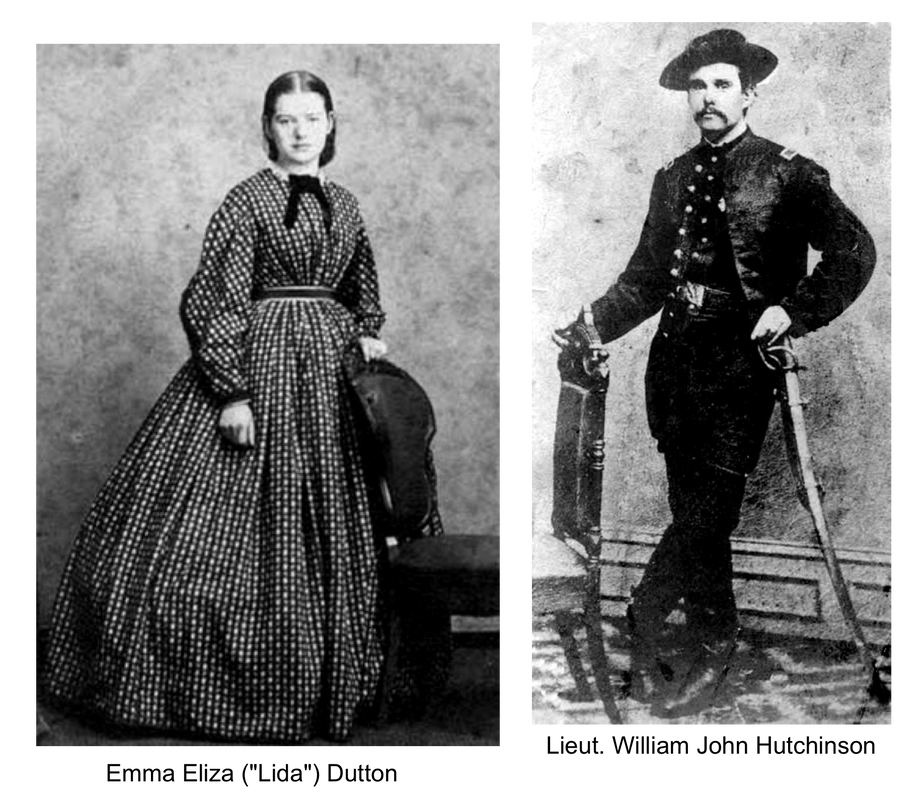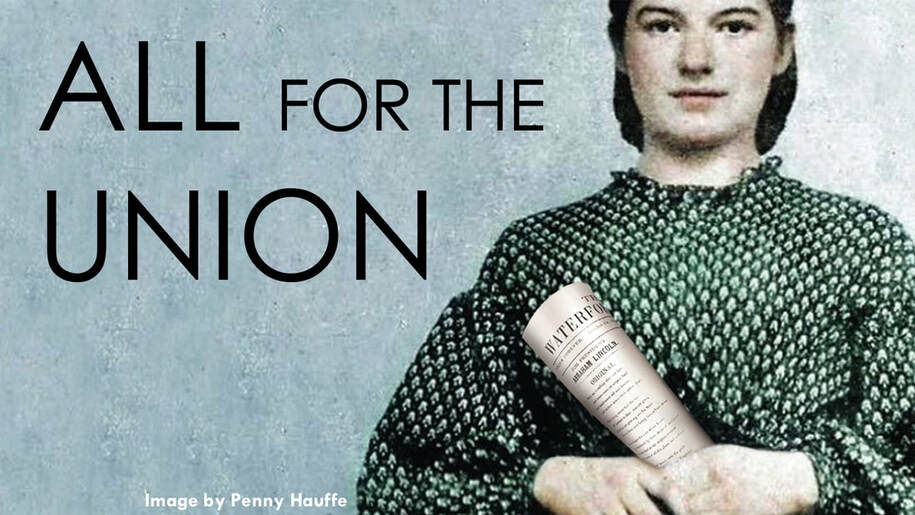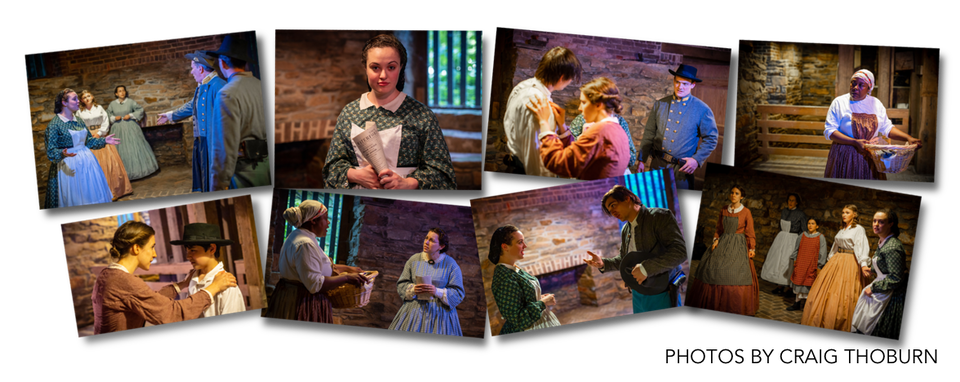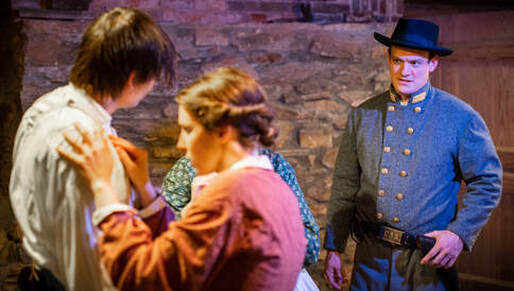Based on the true story of three women fighting for justice in the midst of Civil War.
Written by prize-winning playwright and award winning historian Meredith Bean McMath
"You bring women's history and stories out of the shadows." - Lee Lawrence
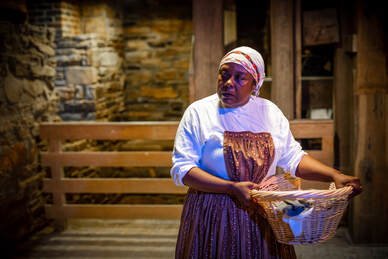 Valerie Konur as Mariah in the 2019 production (Photo by Craig Thoburn)
Valerie Konur as Mariah in the 2019 production (Photo by Craig Thoburn)
McMath's original play is based on the true story of Lida, Lizzie and Sarah - three young pro-Union women living in Confederate Loudoun County, Virginia who chose to write a newspaper to boost the morale of Union soldiers. As a result, they became the first Female journalists of Virginia. Their Waterford News covered the reality of their daily lives - from skirmishes, battles and Confederate foragers to Union burning raids and personal loss - all with unshaken hope and ironclad humor. The play explores why they made those choices and leaves the audience to wonder whether they'd do the same.
"Like a documentary, the show depicts the reality of life in a particular place at a particular time. Like the best entertainment, it features characters who appeal to the audience." - Patti H. Snodgrass, Loudoun Times Mirror
ROYALTIES
As a prize-winning playwright an award-winning historian, McMath is pleased to offer All for the Union at one-third a normal royalty fee to historic preservation organizations and theatres working with organizations dedicated to the knowledge of previously unknown heroes who remained loyal. The play focuses on three heroes - Lida and Lizzie Dutton and Sarah Steer - who were the first female journalists in Virginia and published an underground newspaper for Union Soldiers during the last half of the war.
POSSIBLE PRODUCTION ELEMENTS
FOR PRODUCTION FLOW
- Scene changes should be seamless – no time between
- Immediate change to lights and sound should at each scene’s end
- Actors are encouraged to play the moments in each scene - make them count
SIMPLE SET / LIGHTS / SOUND
- Black Box
- One or more periaktoi to support seamless scene changes
- LED clamp lights controlled by iPad or iPhone
- Enhanced offstage sound effects (Not completely literal)
COSTUMES
QUAKERS: Women of Waterford, Virginia wore garments identical to those found on any street in America at the time, including hoops (referred to in The Waterford News), and Waterford Quakers were of the Hicksite persuasion, a liberal faction of Orthodox Quakerism. They wore broaches and earrings, and the only restriction they placed on themselves was to avoid ostentatious display such as vibrant colors or decorative dress elements. They wore shawls and bonnets when out of doors (gloves, too, but these might have been worn out due to the war, so they aren’t really necessary).
Mother, Emma Dutton, would wear a head covering indoors - a simple cap or something from Mrs. Dutton’s Quaker youth (a plain cap made of see-through fine linen).
Gentlemen Quakers had no restrictions on facial hair, and beards, mustaches, and sideburns - or some combination thereof, were popular. A man's Quaker hat was circular, broad-brimmed and low crowned - often of straw. The liberal Hicksites wore black frock coats and vests (Orthodox Quakers considered black a worldly color).
Best to borrow/rent soldiers’ uniforms and equipment from Civil War re-enactors (or dirty up reproduction costumes), because shop rentals may err on the side of cleanliness.
REHEARSING IN COSTUME
WOMEN: It is extremely helpful to have women wear hoops and/or corsets during rehearsals.
Women need to learn how to sit in the hoops and work on having their movements become natural and graceful. To sit in a hoop, she brings one hand to the middle of the back of her skirt, lets fingertips find the nearest available hoop, raises the hoop three or four inches and sits. The hoops will fold neatly under and around her. To go up stairs, she raises her skirt 3 or 4" with one hand. No need to hold the skirt when coming down, because the weight of the skirt will force the hoop skirt away from the feet.
MEN: To get used the feel and heft, have infantry officers wear pistol belts with hats. For infantry, add infantry belts, rifles and caps. Add haversacks when on the road. For cavalry: revolver belts and swords and cap or hat. Lieutenant Hutchinson in particular needs to be able to smoothly remove and return his revolver and sword / sword belt with ease — as though he’s done it every day of his life for the last three years.
History and Images of Waterford, Virginia: https://www.waterfordvillage.org/.
For PERFORMANCE RIGHTS, contact Meredith Bean McMath via Run Rabbit Run Productions at [email protected] or by calling McMath at 571-209-7386.
TRUTH vs FICTION in ALL FOR THE UNION
